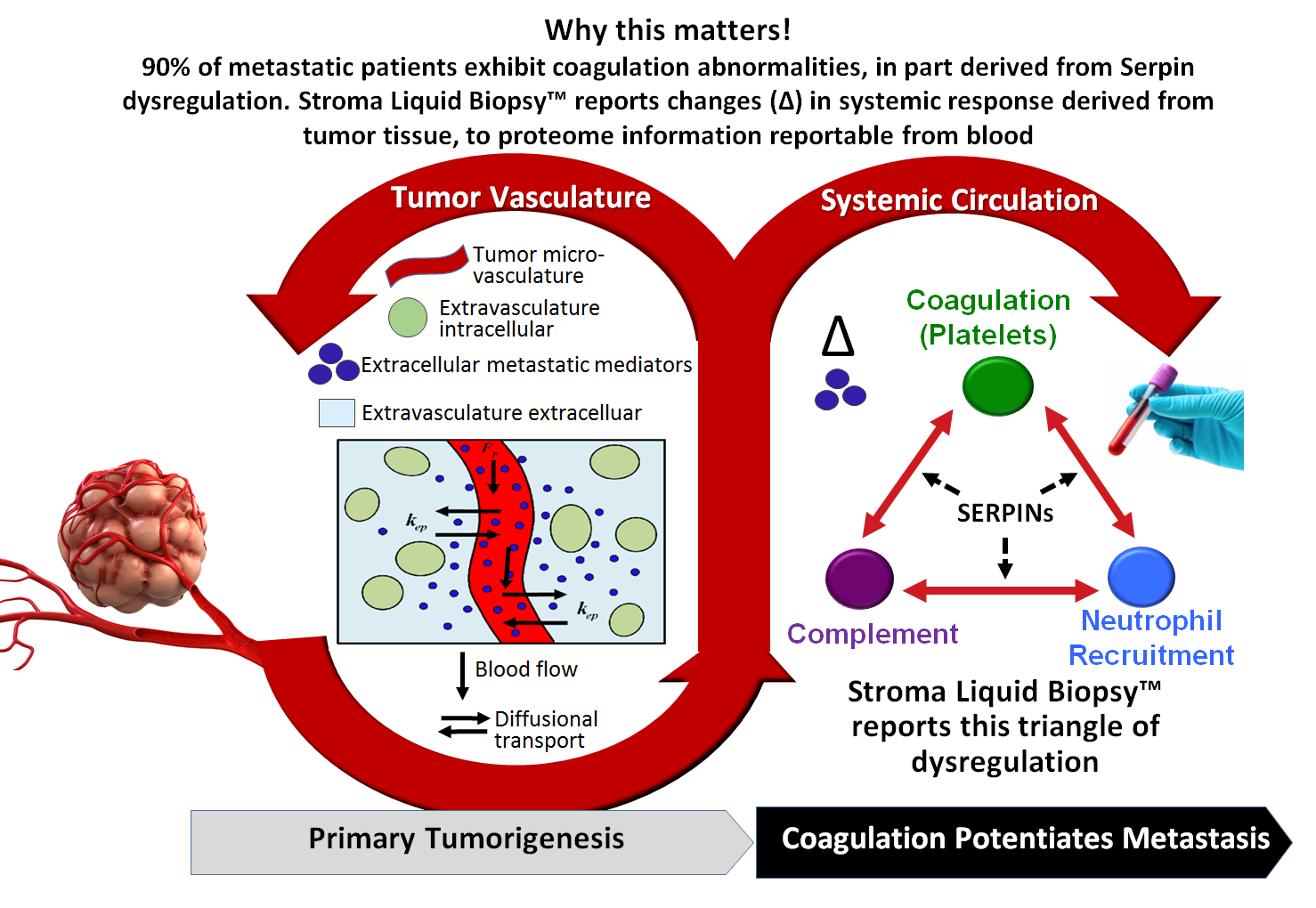
Poster Report Describes Loss of Functional Serpin Activity In Cancer Patient Blood
Case Study: Methods to monitor the influence and potentially modulate the stromal conditioning of cancer, offers new avenues for diagnosis, personalized medicine, and therapeutic modalities.
Background
Commercial enthusiasm continues for the prospects of characterizing cancerous tissue non-invasively through liquid biopsy biomarkers. However, the vast majority of the biomarkers being investigated serve to report the landscape of DNA mutations associated with tumor burden; only part of the full picture of progressive disease. The other largely neglected part of tumors, comes from the cooperation of the normal host response to inflammation. This
stromal conditioning assists the tumor ecosystem so that ultimately signals originating in the primary tumor enable cancer cells to enter the general blood circulation and metastasize to distant sites.
The Challenge
Because of the survival crisis associated with metastasis, there remains an urgent need to better characterize the nature of stromal conditioning of tumor microenvironments, ideally from non-invasive samples types such as blood. Current liquid biopsy biomarkers do not support this need as they report only DNA mutations, or very low abundance proteins shed from malignant cells (i.e., CEA).
The Solution
By measuring the proteome content associated with the systemic response from blood, we can infer information regarding localized tumor microenvironments.
Dr. Ingrid Verhamme from Vanderbilt University presented a poster, co-authored and in collaboration with Biotech Support Group, describing the loss of functional activity involving 2 major serum proteins, and the potential consequences of such loss in the progression of cancer. The poster was presented at The Serpins2019 Conference, September 19-22, 2019 in Sevilla, Spain and entitled “Loss of Functional Alpha-1-Antitrypsin and Heparin Cofactor II in Inflammation and Cancer”. Authors were: Ingrid M. Verhamme, Vanderbilt University Medical Center; Nashville TN, Swapan Roy, Sowmya Avadhani, Matthew Kuruc, Biotech Support Group LLC, Monmouth Junction NJ.
Previous to our new data, blood serum levels of the Serine Protease Inhibitor family known as Serpins have been reported by immunological methods (ELISA). These reports very often demonstrate a higher level of serpin quantities in cancer patient blood. Nevertheless, measurements of functionally active forms were not assessed in any way. This can lead to egregiously misleading interpretation of a host’s systemic response to cancer, as the immunological assay measures in aggregate the functionally opposite intact and cleaved serpin forms. In contrast to these methods, we demonstrate that with albumin depleted (AlbuVoid™) serum samples combined with LC-MS/MS, there is potential of distinguishing between active and cleaved subpopulations of serpins. In this poster, we describe how LC-MS/MS data correlates to enzymatic data confirming the differential regulation of serpin forms in cancer. Significantly, cancer patients have a greater amount of cleaved serpin forms relative to normal. The cleaved forms are the product of the substrate pathway in the bifurcated serpin suicidal mechanism, becoming permanently inactive. Such dysregulation can become more pronounced due to serpin mutations or changes in the micro-environment.
Highlighting the importance of this poster report, Dr. Verhamme states that “Our hypothesis is that there may be a common host systemic response to many forms of cancer, regardless of primary tumor, stage or development of metastatic disease. This response is proposed to involve interconnected pathways attributable to thrombo-inflammation and innate immunity. All these pathways are activated by proteolysis and regulated by protease inhibition. So it is therefore likely that tumorigenesis can systemically be characterized by chronic exhaustion of inhibitory active serpins, and resulting increased protease activity. Our results support such a net decrease in inhibitory active Serpin D1, otherwise known as Heparin Cofactor II. We believe this is a very important discovery as it brings to light a potential new cancer therapeutic strategy, to selectively inhibit Thrombin in the extravascular space, as 60% of Heparin Cofactor II is extra-vascular.”

Innate immunity adaptations are determined by fluid mechanics, so mediators of coagulation in the tumor vasculature are differentially regulated from those of the general circulation. As a result, the permissive conditioning necessary for metastasis is derived from the micro-vasculature at the primary site; loss of Heparin Cofactor II (Serpin D1) function being one important contributor.
The Outcomes
The most compelling prospect for
Stroma Liquid Biopsy™ is as a new way to fundamentally think about the microenvironment componentry of cancer as it relates to the general blood circulation. Serpins are of high abundance, accounting for 2-10% of the protein mass in serum so they have a large influence on an individual’s unique systemic response to cancer. Through our academic collaborators, Biotech Support Group continues to generate evidence that there is a fundamental dysregulation of protease inhibition in tumors that supports the host’s stromal conditioning. With that re-proportioning comes the allowance for cancer to survive and metastasize. Most importantly, these same systemic responses which are derived from tumor tissue vasculature now can be monitored using liquid biopsies. From this, new avenues for diagnosis, personalized medicine, and therapeutic modalities are possible.
Click to download poster “Loss of Functional Alpha-1-Antitrypsin and Heparin Cofactor II in Inflammation and Cancer”
To Learn More About Stroma Liquid Biopsy™, download whitepaper at:
https://www.biotechsupportgroup.com/v/vspfiles/templates/257/pdf/StromaLiquidBiopsyWhitepaper022519.pdf
For more information on the BSG complete line of
Albumin & IgG Removal products, visit: https://www.biotechsupportgroup.com/Articles.asp?ID=451
To discuss license, collaboration and partnership opportunities, please contact
Contact:
Matthew Kuruc 732-274-2866
mkuruc@biotechsupportgroup.com
|